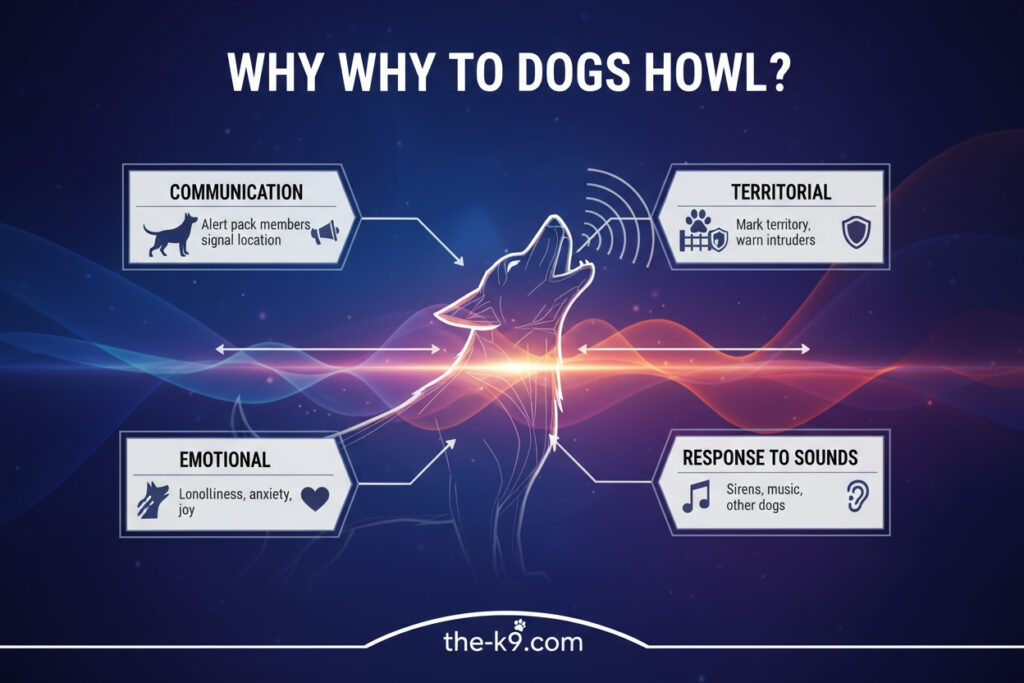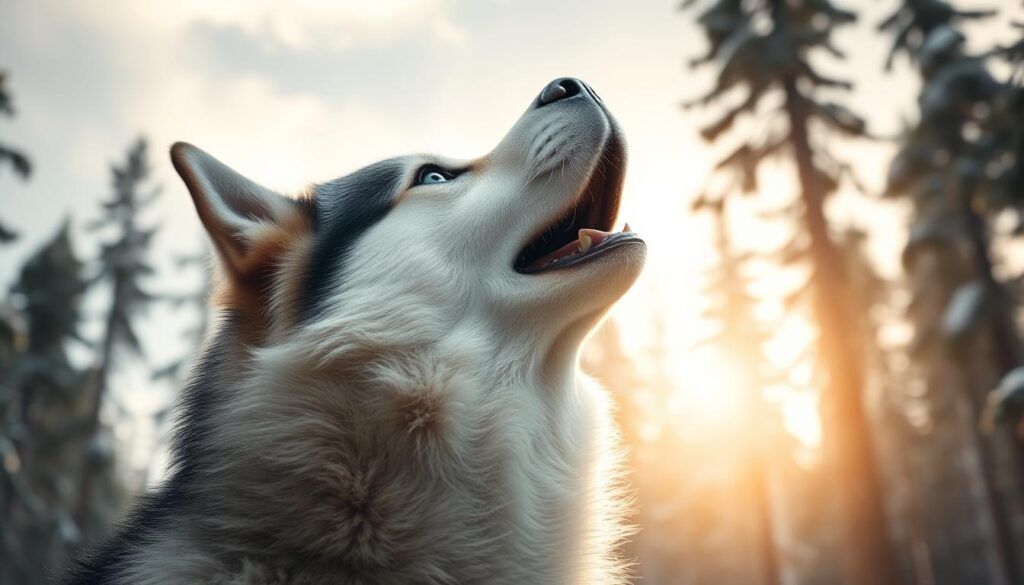
Why do dogs howl a fascinating behavior that has caught the attention of many. It’s important to understand canine communication. This includes howling as one of its many forms.
Dogs howl for different reasons. They might be trying to communicate, seeking attention, or reacting to their surroundings. By understanding these reasons, dog owners can meet their pets’ needs better. This can lead to a more harmonious relationship.
This guide aims to dive deep into dog howling. It will provide insights into dog behavior and the reasons behind it.
The Evolutionary Origins of Why do dogs howl.
Dogs howl because of their wild roots, mainly from their wolf ancestors. Even though dogs have changed a lot, they keep howling as a way to communicate.
Ancestral Connections to Wolves
Wolves use howling to talk to each other. They do this for many reasons, like:
- Locating other pack members
- Warning others of possible dangers
- Signaling their presence to other wolves
Dogs also howl, but it’s different. They do it when they’re excited, scared, or just to talk to their humans or other dogs.
How Domestication Has Influenced Howling Behavior
Domestication has changed how dogs howl. The reasons they howl are similar to their wolf ancestors, but the triggers have changed. Dogs might howl because of:
- Separation anxiety
- Response to environmental stimuli
- Medical issues or pain
Knowing these changes helps us understand why dogs howl. It shows us what they’re trying to say through their dog language.
Why Do Dogs Howl? The Primary Triggers
Dogs howl for many reasons, like social needs, environmental factors, and health issues. Knowing why they howl helps owners manage this behavior better.
Communication with Other Dogs
Dogs howl to talk to other dogs. It’s a way to call out, signal they’re there, or even chat from far away. Research shows dogs can understand different howls and react to them.
Response to Environmental Stimuli
Dogs are very sensitive to their surroundings. Certain things can make them howl, like:
Music and Sirens
Many dogs howl when they hear music or sirens. Sirens, in particular, sound like other dogs howling, making dogs howl back.
High-Pitched Sounds
High-pitched noises, like sirens or music, can also make dogs howl. They think these sounds are other dogs calling out.
| Stimulus | Common Response |
|---|---|
| Sirens | Howling |
| Music | Howling or Barking |
| High-Pitched Sounds | Howling |
Separation Anxiety and Distress
Dogs with separation anxiety howl when left alone. This shows they’re upset and might also pace, destroy things, or try to get out.
Medical Issues and Pain Signals
Howling can also mean a dog is in pain or has a health problem. Dogs may howl to show they’re uncomfortable or in pain, due to issues like arthritis.
Knowing why dogs howl is key to fixing the problem. Owners can address howling by figuring out if it’s due to needing to talk, reacting to their environment, feeling anxious, or having health issues.
Case Studies: Different Howling Patterns Across Breeds
Different dog breeds show unique howling patterns. This shows their varied origins and uses. It’s a fascinating study that helps us understand how dogs communicate and what affects their behavior.
Huskies and Northern Breeds: The Vocal Champions
Huskies and other Northern breeds are known for their loud howls. These howls come from their ancient past. They were bred to communicate over long distances, like when pulling sleds.
The Husky Howl: A Case Analysis
The Husky howl is melodic and haunting. This distinctive howl serves as a form of long-distance communication. It helps Huskies tell other dogs where they are and how they feel.

Studies show Huskies howl more when they hear sirens or other dogs. This is part of their pack behavior. Howling helps them stay connected with their group.
Hounds and Their Distinctive Howls
Hound breeds are known for their hunting skills. They have deep, resonant howls. These howls come from their history as hunting companions.
“Hounds are bred to follow their noses, and their howls are an integral part of the hunting process, helping hunters track the location of their quarry.”
Hounds howl when they smell prey or during the chase. It’s a way for them to communicate with their handlers.
| Breed | Howling Pattern | Trigger |
|---|---|---|
| Huskies | Melodic, haunting | Auditory stimuli, social bonding |
| Hounds | Deep, resonant | Scent of prey, hunting |
Unexpected Howlers: When Typically Quiet Breeds Vocalize
Some breeds are quiet but can howl when stressed or anxious. For example, toy breeds might howl when left alone.
Understanding these variations in howling behavior is key for dog owners. It helps them meet their dog’s emotional and physical needs.
Analyzing Your Dog’s Howling Behavior
Understanding why your dog howls can help solve the issue. First, you need to know what triggers their howling.
Identifying Context and Triggers
Start by figuring out when and why your dog howls. Is it when they hear a siren or another animal? Or does it happen randomly? Knowing what makes them howl is key.
- Watch for patterns in when and where your dog howls.
- See if changes in their routine or environment are linked to howling.
- Think about your dog’s breed and how it might affect their howling.
Distinguishing Between Normal and Problematic Howling
Not all howling is a problem. Some breeds naturally howl more. But, if your dog howls too much, it might mean they’re stressed or sick.
To tell if it’s normal or not, look at these points:
- How often and long your dog howls.
- How it affects their mood and life.
- Any big changes in their life that might cause the howling.
Keeping a Howling Journal: A Case Study Approach
Keeping a journal of your dog’s howling can help. Write down when, where, and why they howl.
Sample Tracking Template
| Date | Time | Context | Duration |
|---|---|---|---|
| 02/15 | 8:00 PM | Siren | 5 minutes |
| 02/16 | 9:00 AM | Separation | 10 minutes |
Looking at your journal can show you patterns. This helps understand your dog’s howling better.

Effective Management Strategies for Excessive Howling
Managing a dog’s excessive howling needs a mix of training, changing the environment, and getting professional help. Knowing why your dog howls and using the right strategies can help a lot. This way, you can make your dog’s howling less frequent.
Behavioral Training Techniques
Training your dog is key to controlling howling. Two good methods are desensitization and positive reinforcement.
Desensitization Methods
Desensitization means slowly getting your dog used to things that make them howl. For instance, if sirens upset your dog, start with a soft recording. Play it while doing something fun with your dog. Then, you can make the sound louder over time.
Positive Reinforcement Approaches
Positive reinforcement means rewarding your dog for being quiet. Give them a treat or praise them when they stop howling. This teaches them that being quiet is good.
Environmental Modifications
Changing your dog’s surroundings can also help. You might block their view of the street or use white noise machines. Also, make sure they get enough exercise and mental play to avoid boredom.
When to Seek Professional Help
If your dog’s howling doesn’t stop or is a problem, get professional help. Animal behaviorists or vets can help find out why your dog howls. They can also create a plan to manage it.
Working with Animal Behaviorists
Animal behaviorists can find out what makes your dog howl. They’ll make a training plan just for your dog. They’ll also teach you how to use desensitization and positive reinforcement.
Veterinary Interventions
Vets can check for health problems that might cause howling. They can also help with pain or discomfort that might be making your dog howl.
Using these strategies together can help manage your dog’s howling. This improves your dog’s life and yours too.
The Language of Howls: What Your Dog Is Trying to Tell You
Dogs howl to share their needs and feelings. It’s important to understand what they’re trying to say. This helps us connect better with them.
Watching how your dog reacts to different situations can tell you a lot. It might be because they’re scared or missing you. Knowing why they howl helps us help them.
It’s not just about answering their howls. It’s about understanding what they mean. This way, we can build a stronger bond with our dogs.
As you learn to read your dog’s howls, your connection will grow. You’ll be able to meet their needs better. This is key to their happiness and health.












